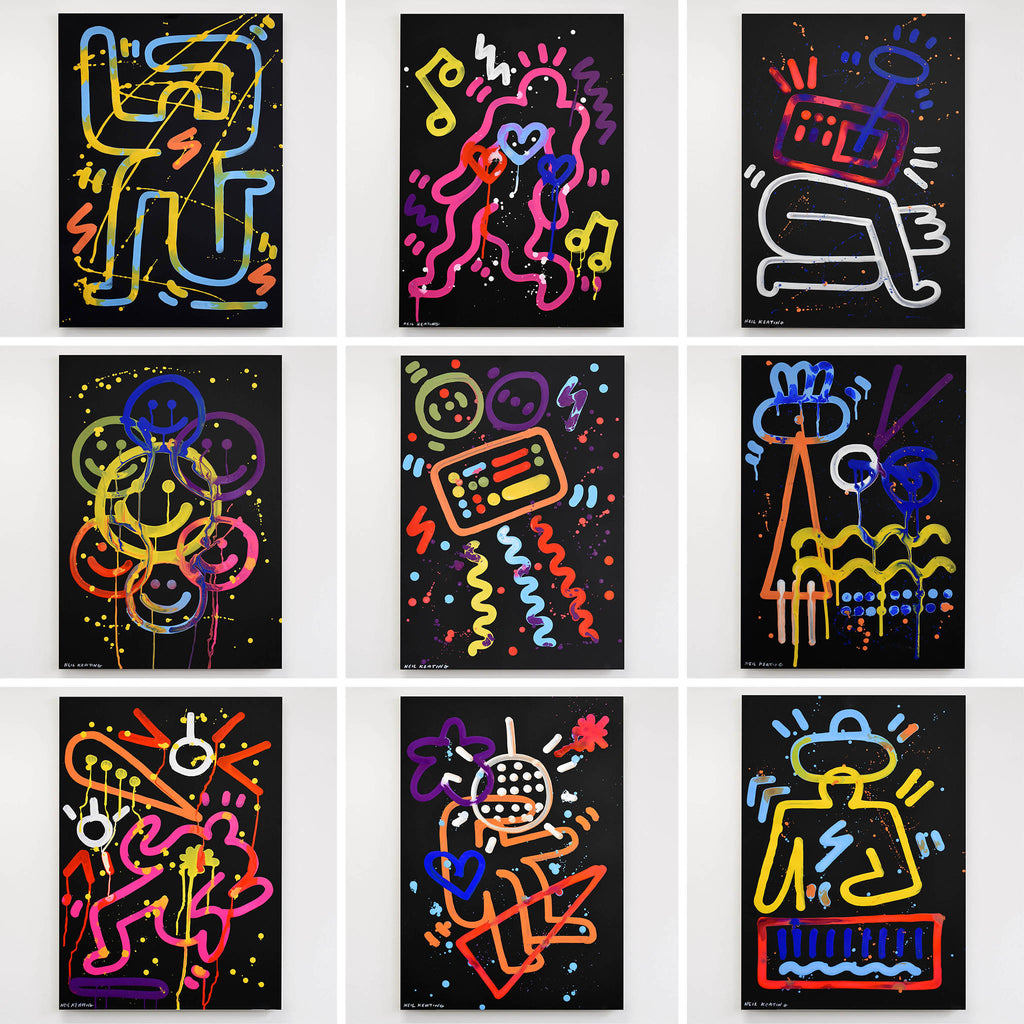A handy guide from Liverpool Audio Network to the tracks behind the first 25 artworks (Numbers 1-25) in Neil Keating’s 100 Collective - History of House live art project.
#1 Aint No Mountain High Enough / Diana Ross / 1970
"Ain't No Mountain High Enough" by Diana Ross, released in 1970, became a Motown hit and a timeless classic, originally recorded by Marvin Gaye and Tammi Terrell in 1967. It conveys a message of unwavering love and commitment, showcasing Diana Ross's powerful vocals and marking a significant moment in her solo career after leaving The Supremes.
#2 I Feel Love / Donna Summer / 1977
Donna Summer's "I Feel Love," released in 1977, is often considered one of the most influential tracks in the history of electronic and dance music. Produced by Giorgio Moroder, it featured a pioneering use of synthesizers and marked a shift towards a more futuristic and computerized sound, setting the stage for the electronic dance music (EDM) movement.
#3 Love Hangover / Diana Ross / 1976
Diana Ross's "Love Hangover," released in 1976, is a disco masterpiece that seamlessly blends elements of soul and pop. It's known for its unique structure, starting as a slow ballad before transitioning into an uptempo disco groove, showcasing Diana Ross's versatility as an artist and earning her another chart-topping hit.
#4 Let No Man Put Asunder / First Choice / 1983
"I would say First Choice - Let No Man Put Asunder is a real anchor for House Music for me - the bass & drums alongside of soul vocals made it a blueprint for House Music for me” Track selected by Roger Sanchez
#5 Oxygene, Pt. 4 / Jean Michel Jaare / 1976
Jean-Michel Jarre's "Oxygene, Pt. 4," released in 1976 as part of his "Oxygène" album, played a pivotal role in popularizing electronic music. It's a serene and hypnotic composition that helped establish ambient and electronic music as a significant genre, paving the way for the electronic music revolution of the late 20th century.
#6 The Model / Kraftwerk / 1978
Kraftwerk's "The Model," released in 1978, is a pioneering electronic track that encapsulated the emerging synth-pop sound of the late 1970s and early 1980s, laying the groundwork for the electronic music genre's future evolution.
#7 You make me feel / Sylvester / 1978
Sylvester's "You Make Me Feel (Mighty Real)," released in 1978, became an anthem of the LGBTQ+ disco scene, reflecting the liberation and empowerment of the era, and contributing to the mainstream acceptance of disco music.
#8 Love Sensation / Loletta Holloway / 1980
Loleatta Holloway's "Love Sensation," released in 1980, is a disco and house music staple, known for its powerful vocals and the basis for many iconic dance remixes, influencing the development of house music.
#9 I want to thank you / Alicia Myers / 1981
Alicia Myers' "I Want to Thank You," released in 1981, is a soulful disco track that resonated with the evolving sound of the early 1980s, blending elements of R&B and dance music.
#10 Jungle D. J. & Dirty Kate / Kikrokos / 1978
Kikrokos' "Jungle DJ" and "Dirty Kate," both from 1978, are disco classics that captured the vibrant and energetic spirit of the late 1970s nightclub scene, showcasing the fusion of funk and electronic elements.
#11 FEELS GOOD/YOU GOT THE LOVE (COSMIC BOOGIE MASH-UP) / ELECTRA/CANDI STATON / 1982 & 2009
ELECTRA/CANDI STATON's "Feels Good/You Got the Love" (Cosmic Boogie Mash-Up) represents a fusion of disco and funk elements, epitomizing the dancefloor culture of the late 1970s and early 1980s.
#12 Blue Monday / New Order / 1983
"Blue Monday" by New Order, released in 1983, is a seminal electronic dance track that holds a special place in the history of electronic music. It's renowned for its pioneering use of synthesizers and drum machines, establishing a distinct sound that combined post-punk and electronic elements. The song's significance lies in its role in shaping the direction of dance music, as it marked the transition from the post-punk and new wave era to the emerging electronic dance scene.
The vinyl release of "Blue Monday" is particularly notable because it famously cost more to produce than the band made from its sales due to its innovative packaging – a die-cut sleeve designed to resemble a floppy disk. This decision demonstrated New Order's commitment to pushing creative boundaries, even at the expense of profitability, and further solidified their reputation as innovators in the music industry.
"Blue Monday" is also intrinsically linked to the Haçienda nightclub in Manchester, England, which became an epicenter of the emerging rave and dance culture in the late 1980s and early 1990s. New Order co-owned the Hacienda, and their success with tracks like "Blue Monday" played a pivotal role in the club's popularity and its status as a cultural hub for electronic music. The song's pulsating beats and infectious melodies became anthems of the Hacienda's legendary club nights, contributing to its iconic status in the history of dance music.
#13 Time To Jack / Chip E / 1985
Chip E's "Time To Jack," released in 1985, is another early house music track that played a pivotal role in the development of Chicago house music, contributing to the genre's evolution.
#14 No UFO’s / Juan Atkins / 1985
Juan Atkins' "No UFO's," released in 1985 under his Model 500 alias, is a significant track in the history of techno, showcasing the futuristic and minimalist sound that would define the genre in the years to come.
#15 Bad Habits / Jenny Burton / 1986
Jenny Burton's "Bad Habits," released in 1986, is a dance-pop and freestyle hit that represents the fusion of various electronic and dance music styles of the era, reflecting the diversity of the 1980s dance music landscape.
#16 R U Hot Enough / Virgo/ 1985
"This song was my introduction to Chicago House Music and one of the first house tracks I played as a dj to my audience up in the Bronx! 1985 19 years old. At my first club residency “The Devil’s Nest”. Actually if you listen to Freestyle Orchestra “Phantasm” produced by Little Louie Vega there is proof how it inspired me to make that track about 2-3 years later, One of my early first few house productions - That’s when I bought my first sp1200 drum machine and after that it was 🔥🔥🔥🔥🔥 all the way - I made that track with my first sp1200 drum machine at home!” Track selected by Louie Vega
#17 Love Cant Turn Around / Farley Jackmaster Funk / 1986
"Love Can't Turn Around" is a classic house music track released in 1986 by Farley Jackmaster Funk (real name: Farley Keith) featuring the vocals of Darryl Pandy. The song is considered a pivotal moment in the evolution of house music, blending elements of disco, funk, and electronic music. Darryl Pandy's powerful and soulful vocals in the track added a distinct flavor, making it a dancefloor anthem that remains influential in the house music genre.
The vocalist who portrayed the Cowardly Lion in the Broadway production of "The Wizard of Oz" was actor and singer Bert Lahr. He is best known for his iconic portrayal of the Cowardly Lion in the 1939 film adaptation of "The Wizard of Oz," and he later reprised the role on Broadway in the original stage production of the musical.
#18 Can You Feel it (original instrumental version) / Mr. Fingers / 1986
"The original version didn't have the vocal samples they later added (the original is still the best!) It was just this deep pulsing bass that sounded like nothing else you'd heard. This record would have been incredible if, like most Chicago House at the time, it just revolved around that perfect bassline but Larry Heard, who wrote the track, did the unthinkable! He put some cool jazzy chords over the top of that bassline! No one else, at that time, had ever done anything like that. And just like that, in that moment he changed the face of House music forever. You didn't need to Jack to this record as most of the House at the time commanded you to. You could close your eyes and drift off to this and be consumed by the washes of synths while still being able to dance to it. The impact it had on me when I heard this record was profound but I was just hearing it in my room so I can't imagine what it would have sounded like for the time in a club. I still play this when I DJ, even if I am playing a modern set, as it fits with everything. It is timeless, it is ground-breaking, it transcends genres, it is beautifully understated and was the birth of deep house. A true masterpiece.” Track selected by Suddi Raval
#19 Move your body / Marshall Jefferson / 1986
Track selected by Todd Terry
#20 Jack Your Body / Steve Silk Hurley / 1986
"Not only due to my own history with the track and Steve himself having remixed it in 2012 - The original track was the first UK number 1 House Music Track so really helped the UK understand house music!” Track selected by Doorly
#21 No Way Back / Adonis / 1986
Adonis's "No Way Back," released in 1986, is a foundational track in the history of Chicago house music, known for its pulsating bassline and repetitive vocal samples. It played a crucial role in shaping the sound and culture of underground dance music, influencing subsequent generations of electronic music producers and DJs.
#22 Goodbe Kiss / Eddie Flashin Fowlkes / 1986
Eddie Flashin Fowlkes' "Goodbye Kiss," released in the late 1980s, is a Detroit techno classic that exemplifies the city's techno movement. It contributed to the establishment of Detroit as a global hub for techno music and represents the city's unique techno sound characterized by soulful melodies and futuristic electronic elements.
#23 House Nation / The House Master Boyz and The Rude Boy of House / 1986
The House Master Boyz and The Rude Boy of House's "House Nation," released in 1986, is a seminal track in the history of house music. It encapsulates the spirit of the emerging house music culture in Chicago, celebrating the sense of community and unity found on the dancefloor, and it helped solidify house music as a global phenomenon.
#24 Someday / Ce Ce Rogers / 1987
Track selected by Heather Small (M People)
#25 Promised Land / Joe Smooth / 1987
"The message in this track is so powerful, and resonates with me so much. Being a black queer female, We're constantly fighting for equality, peace & love - Any track that still gives you those feels 30+ years later and stood the test of time, is iconic.” Track selected by Syreeta
Listen to the playlist on Spotify here.
Follow Neil Keating on Instagram here & Liverpool Audio Network here

